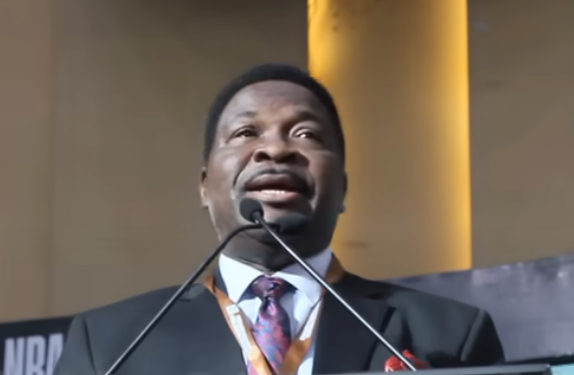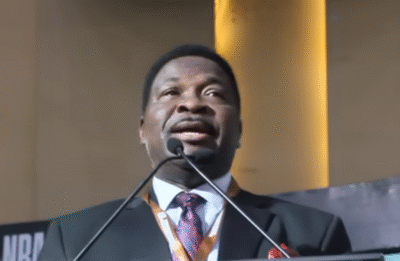
Citizens’ Rights vs. National Security: Mike Ozekhome Electrifies Enugu, Lawyers with Fiery Speech and Fela Rendition
Senior Advocate of Nigeria Mike Ozekhome’s performance in Enugu was not just a legal paper; it was political theater. For lawyers, it was a dare to reclaim their role as guardians of society. For citizens, it was a reminder that rights are not granted by governments but defended by people willing to stand up.

Enugu, Nigeria — In a dazzling performance equal parts law lecture, political critique, and theatrical satire, constitutional lawyer and Senior Advocate of Nigeria (SAN), Mike Ozekhome, set the Enugu stage alight with a provocative paper titled “Citizens’ Rights and Security Concerns.” Addressing a hall packed with lawyers, military officers, and civil society stakeholders, Ozekhome challenged Nigeria’s long-standing security narratives, deconstructed state power, and—channeling Afrobeat legend Fela Anikulapo Kuti—challenged the very institutions tasked with protecting the citizenry.
“National Security” or “Government Security”?
Ozekhome wasted no time in puncturing what he called the “grand lie” of Nigeria’s leadership since the 1914 amalgamation: the notion of national security.
“From colonial masters to military juntas to civilian administrations,” he declared, “what they call national security has always been nothing more than government security — the protection of those in power, not of ordinary citizens.”
He painted a grim picture: Nigerians who embarked on a simple road trip to Enugu to attend the conference were escorted by heavily armed security personnel, a fact he cited as proof that safety remains a privilege of the political class, not a universal right.
The Lawyer’s Duty and State Harassment
In a bold personal disclosure, Ozekhome recounted his own battle with the Economic and Financial Crimes Commission (EFCC), which seized ₦75 million in legal fees he earned from a client.
“Some colleagues told me to let it go,” he said. “But if we, as lawyers, cannot defend our own rights, how then can we fight for the rights of ordinary Nigerians?”
He emphasized that lawyers must never be criminalized for accepting legitimate fees unless proven to be complicit in laundering proceeds of crime. Instead, he insisted, state institutions should focus on prosecuting the true offenders: those committing the predicate crimes. Courts later faulted the EFCC’s actions, affirming that a lawyer is entitled to fees without a legal duty to investigate a client’s payment source.
Beyond Physical Safety: Expanding the Idea of Security
Departing from traditional discourse, Ozekhome urged Nigerians to think of security beyond guns, checkpoints, and physical safety.
“There are other forms of security: emotional, mental, educational, job, economic, and financial security,” he argued. “Many Nigerians are broken, even mad, not because they are inherently unstable, but because Nigeria has happened to them.”
By highlighting these overlooked dimensions, Ozekhome broadened the conversation from mere law-and-order to the structural injustices that erode dignity and opportunity.
Human Rights as Inalienable Property
Linking international covenants with natural law, Ozekhome invoked the Universal Declaration of Human Rights (1948), the African Charter on Human and Peoples’ Rights, and other conventions to remind his audience that rights are inherent and not gifts from the state.
“You have freedom of speech because God gave you your mouth,” he said. “You have freedom of movement because God gave you your limbs. They are not donated by governments — they are inalienable.”
To hammer home the point, he broke into Fela’s iconic “Beasts of No Nation,” singing:
“Human rights na my property. You no fit give me my property. Animal wan give me my property!”
Turning inward, Ozekhome accused Nigerian lawyers of reducing their calling to a “bread and butter profession,” more preoccupied with politicking at bar association conferences than interrogating power or challenging impunity.
“If we continue to politicize like professional politicians, who will defend society? Who will challenge governmental excesses?” he asked.
He called on lawyers to “stand up and stand out,” warning that the annual rituals of legal conferences risk becoming hollow if not connected to substantive reforms in governance and justice delivery.
Ozekhome’s intervention comes at a time when Nigeria faces rising insecurity from state actors and non-state actors, causing institutional distrust. His insistence that rights and broader notions of security must guide governance is a reminder that stability cannot be achieved by brute force alone.
By invoking Fela, by telling his own story, and by confronting power with courage, Ozekhome fused law, art, and activism into a singular message: a nation without citizens’ rights is a nation without true security.